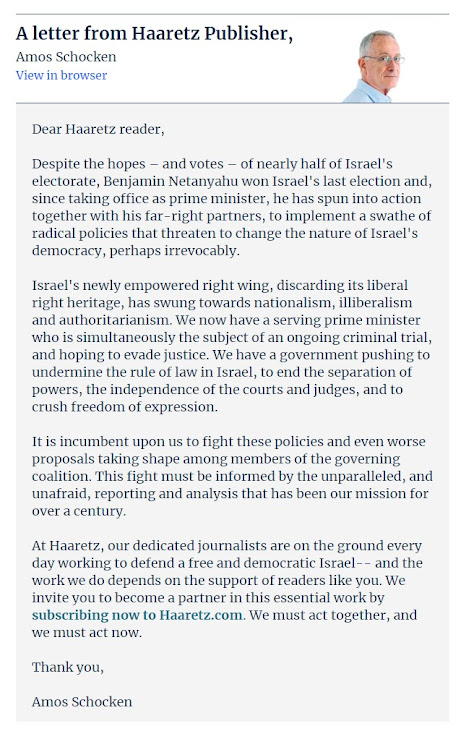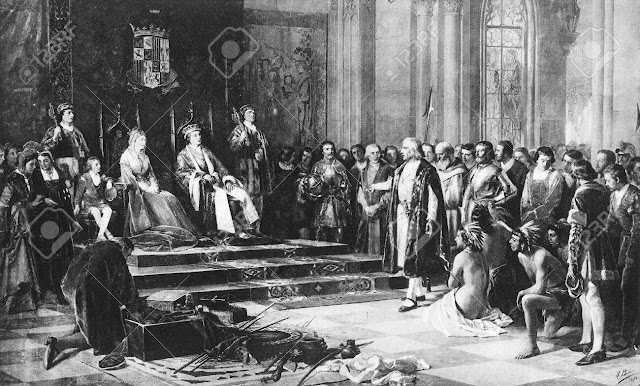Under publisher Amos Schocken, Haaretz thinks of itself as a champion in shaping Israel, calling upon Israelis to follow its lead (after subscribing, of course).
Schocken's call to arms against the Israeli government is not really unexpected. Haaretz's radicalism is part of the history of the newspaper under the Schocken family:
[Amos Schocken] had inherited it from his father and grandfather, and the legacy seems to have included an ambivalent relationship with the Jewish state. His grandfather, Salman, who had fled from Germany to Palestine, had been, according to Remnick, a supporter of Brit Shalom, an organization of Jews favoring a bi-national state rather than a Jewish one. The paper passed to Salman’s son, Gershom (née Gustav), who once wrote an essay about the need to remove the religious prohibition on intermarriage so as to encourage the emergence of a homogeneous Israeli nationality to supersede those of Jew and Arab...Gershom’s son, Amos, acquired the paper upon his father’s death in 1990 and has given it editorial direction since then. [emphasis added]
Haaretz's strong left-wing roots haven't stopped Schocken from speaking out from time to time, in fairly conservative terms, on what a newspaper in general is supposed to be. In 2008, The Jerusalem Post reported on a rumor of a "purge" at Haaretz, and a new "moderate" era at the paper. In response, Schocken told the media site The Seventh Eye:
I understand there are those readers who want Haaretz to look like a protest [manifesto] against the occupation - for example, Ashkenazi, secular and righteous, and focused on the occupation. But a newspaper is not a protest [manifesto]; it's a newspaper...If it were possible, then, I would be ready to be the publisher of a newspaper that solely campaigned against the occupation till its end. The problem is that some of those protesting against the occupation also want to know what is happening in the shops of Comme Il Faut [a clothing chain]. So we were concerned that they wouldn't take out a subscription to the newspaper that I am prepared to be the publisher of. [emphasis added]
Schocken is not actually averse per se to running Haaretz as a protest manifesto, its just that a newspaper has to be able to pay the bills and has to take into account the concerns of its readership. Here, he conjectures that a portion of his readership is concerned about what is happening "in the shops of Comme Il Faut," as opposed to what is happening in Israel.
He got closer to the mark a few years later. In 2011, Haaretz was criticized for its coverage of the Fogel family massacre, when it decided not to feature the story on the front page -- choosing instead to feature a report on the Japanese tsunami that occurred on the same day. In 2012 Schocken defended this choice to a Haredi audience, laying out the role of Haaretz as he saw it. He told them that, "with all due respect for the family at Itamar, when you compare that event, which was very grave – it was not the first time that Palestinians murdered Jews." Schocken tied this in with how he saw the responsibility of Haaretz:
The role of a newspaper as I understand it, and as Ha’aretz has understood throughout the years, even before I became responsible for the paper, even when my father was there...is not to give expression to emotionalism and feelings, but to give readers information about the important things. To set some sort of hierarchy of importance...
The role of Ha’aretz is also to provide a perspective of how important things are in the world we live in. What is the role of a newspaper, after all? To give the reader some kind of picture of reality that is as faithful to reality as is possible. [emphasis added]
That sounds like a fairly conservative approach. Yet just 2 years later, in 2014, Schocken published a call to Israelis, and in his manifesto described what Israelis could accomplish by subscribing to Haaretz:
By doing so, you will become a partner in the ongoing effort to shape Israel as a liberal and constitutional democracy that cherishes the values of pluralism and civil and human rights. You will become a partner in actively supporting the two-state solution and the right to Palestinian self-determination, which will enable Israel to rid itself of the burdens of territorial occupation and the control of another people.
Now, according to Schocken, this is all actually part of being a newspaper:
Influencing the way Israel evolves is a daily effort of news gathering, reporting developments and creating editorial positions and sometimes campaigns to prevent negative outcomes and encourage positive ones.
So the goal of Haaretz is "to give the reader some kind of picture of reality" while "influencing the way Israel evolves."
But if the picture of reality it tied to an agenda, what happens when reality does not cooperate?
David Landau, a former editor-in-chief of Haaretz and the founder of its English-language edition had his own way of dealing with the problem. In 2005, when CAMERA contacted the paper requesting a correction, an assistant editor accidentally responded with an email intended for internal circulation:
We have a quasi ‘policy,’ on orders of David [Landau], to ignore this organization and all of its complaints, including not responding to telephone messages and screening calls from [its] director.
According to an article by Joshua Muravchik in Commentary Magazine, Landau justified this by claiming CAMERA had a “vendetta,” a convenient way of avoiding having to deal with whether the criticisms from CAMERA were valid or not.
Like Landau, Schocken similarly defends his reporters. In the above Letter From The Editor last week, he wrote that, "at Haaretz, our dedicated journalists are on the ground every day working to defend a free and democratic Israel."
That includes Gideon Levy.
On October 23, 2012, an article by Levy carried the front-page headline, “Most Israelis Support Apartheid Regime in Israel.” But in fact the survey data did not support either the headline nor Levy’s own analysis. In the face of public criticism, Haaretz published an apology five days later.
Three years ago on Twitter, when this topic came up, Schocken defended Levy, claiming that "bringing this up only proves [Gideon Levy's] other work is beyond reproach. This led to a review of Levy's "other work," based on CAMERA analysis:
At that point, Schocken doubled down:


 Elder of Ziyon
Elder of Ziyon













































